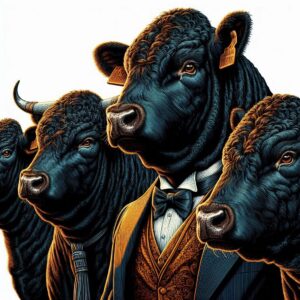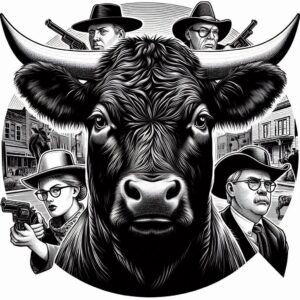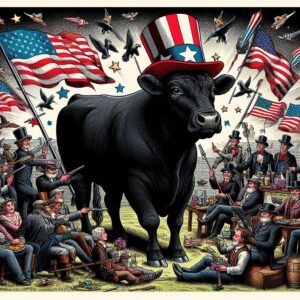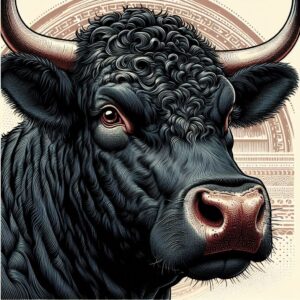Angus Cattle: Black and Red Varieties
Angus Cattle
Angus cattle are a breed of beef cattle known for their solid black or red coloration, high-quality meat, and excellent adaptability to various environmental conditions. Originating from Scotland, Angus cattle have become one of the most popular and widely distributed beef breeds globally.
Historical Background
The Angus breed, also known as Aberdeen Angus, was developed in the early 19th century in the northeastern counties of Scotland. Hugh Watson, a Scottish farmer, is credited with establishing the foundation of the breed. The first herd book was published in 1862, and by the late 19th century, Angus cattle were being exported to numerous countries, including the United States.
Physical Characteristics
Angus cattle are characterized by:
- Coloration: Solid black or red. Black Angus is more common and often referred to simply as “Angus,” while Red Angus is a separate registry in some countries.
- Size: Medium to large build, with mature bulls weighing between 1,800 to 2,400 pounds and cows between 1,200 to 1,600 pounds.
- Polled: Naturally hornless, which reduces injuries and the need for dehorning.
Adaptability and Distribution
Angus cattle are highly adaptable and thrive in a variety of climates, from temperate to arid regions. This adaptability, combined with their excellent meat quality and docile temperament, has contributed to their widespread distribution across the globe. The United States, Canada, Australia, and South America are notable regions where Angus cattle are extensively raised.
Economic Significance
Meat Quality
Angus cattle are renowned for their superior beef, characterized by:
- Marbling: High intramuscular fat content, which enhances tenderness, juiciness, and flavor.
- Consistency: Uniform meat quality across different environmental conditions.
- Certification Programs: Programs like Certified Angus Beef (CAB) ensure that meat meets rigorous standards, further enhancing market value.
Breeding and Crossbreeding
Angus cattle play a significant role in breeding programs:
- Genetic Improvement: They are often used to enhance traits such as growth rate, feed efficiency, and carcass quality in crossbreeding programs.
- Hybrid Vigor: Crossbreeding Angus with other breeds, such as Hereford, can result in offspring with superior growth and health traits.
Challenges and Considerations
Despite their many advantages, Angus cattle face certain challenges:
- Market Competition: Competing with other premium beef breeds requires continuous improvement and marketing efforts.
- Genetic Diversity: Maintaining genetic diversity is crucial to avoid inbreeding depression and ensure long-term breed health.
Angus Cattle in Modern Agriculture
Angus cattle continue to play a crucial role in modern agriculture, particularly in sustainable beef production systems. Their low-maintenance nature, high-quality beef, and adaptability make them suitable for both small and large-scale operations.
Case Study: Angus Cattle in the United States
The United States is a leading producer of Angus cattle:
- Population: A significant portion of the U.S. beef cattle population is Angus or Angus-influenced.
- Industry Support: Organizations like the American Angus Association provide extensive support for breeders, including genetic testing, marketing, and educational resources.
- Innovation: U.S. Angus breeders continually adopt new technologies and practices to enhance the breed’s performance and profitability.
Future Outlook
The future of Angus cattle looks promising with advancements in:
- Genomics: Utilizing genetic tools to improve traits such as feed efficiency, disease resistance, and meat quality.
- Sustainability: Emphasizing sustainable breeding and management practices to meet environmental and consumer demands.
- Global Expansion: Continuing to explore and expand into new markets while maintaining high standards of meat quality and animal welfare.
Conclusion
Angus cattle, both black and red varieties, hold a prominent place in the global beef industry due to their adaptability, superior meat quality, and economic viability. As agriculture evolves, Angus cattle will likely continue to be a key player in sustainable and efficient beef production systems.
Keywords
- Beef cattle
- Angus breed
- Meat quality
- Crossbreeding
- Sustainable agriculture
How Knowledge of Angus Cattle Can Help Farmers
Understanding the significance and status of Angus cattle can help farmers make informed decisions about breeding, management, and marketing strategies. By leveraging the breed’s strengths and addressing its challenges, farmers can enhance productivity, meet market demands, and contribute to sustainable agricultural practices.



